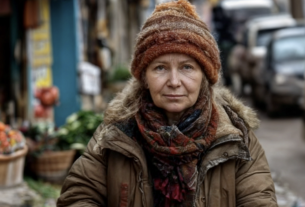“I have to help you because I’m your sister!” Alla stated firmly. “You know perfectly well what situation I’m in right now. I left mom’s three-room apartment to my daughter — she’s about to have a baby, they need their own space. Zhora’s health is bad, he can’t live in unsuitable conditions. And you? What difference does it make where you live?”
Zinaida sat on the couch, staring at one spot. Night had fallen outside; rare headlights of passing cars slid across the window, blurring the gray landscape of the unfamiliar city. Silence and a sense of desolation filled the apartment. After work, she felt especially lonely. For many years she dreamed of moving to a big city where new opportunities would open up, but reality turned out much harsher than she expected. The job brought no joy, she never made friends, and the longing for her hometown only grew stronger.
Suddenly, the phone rang. Zinaida startled and grabbed the receiver.
“Hello?” she said uncertainly.
“It’s me, Alla,” came the voice of her older sister.
The voice sounded strange, tense. Zinaida immediately became wary.
“Alla, what happened?” she asked anxiously.
A pause. Then Alla quietly said:
“Mom is gone…”
Zinaida froze. She knew mom was sick, but still, the news shocked her. Tears streamed down her face uncontrollably.
“Alla… how could this be?” Zinaida sobbed. “When did it happen?”
“This morning,” Alla replied. “She just fell asleep and didn’t wake up. I only just managed to find a moment to call you…”
Zinaida couldn’t speak. She silently listened as Alla spoke about funeral preparations, the troubles, and how hard it was for her now.
“Zin, will you come?” Alla asked.
“Of course, I will,” she promised. “I’ll buy a ticket right now.”
After the funeral, Zinaida stayed in her hometown. She helped Alla pack mom’s things and arrange documents. They talked a lot, reminisced about childhood, shared their feelings.
One evening the topic turned to inheritance.
“We need to decide what to do with the apartment,” Alla began. “You understand, it’s not a simple issue.”
Zinaida nodded.
“I’ve thought about it,” her sister continued. “I have a proposal.”
“What kind?” Zinaida asked.
“You see, my daughter is getting married,” Alla started. “She needs her own apartment. And my husband’s workplace is close to here. Our parents’ three-room apartment is the perfect option for us.”
Zinaida was silent, waiting for more.
“You planned to come back home yourself,” Alla went on. “I know things didn’t work out for you there. I suggest you stay here, take care of grandma, and get her two-room apartment. Grandma’s quite old, she needs help…”
Zinaida thought it over. On one hand, Alla’s logic made sense: the three-room was really better suited for a young family. On the other hand, Zinaida felt hurt. So she was supposed to sacrifice herself again for others?
“What will grandma say?” she asked. “She doesn’t know about our plans…”
“I’ll talk to her,” Alla promised. “I’m sure she’ll agree. She always loved you more.”
After the call, Zinaida couldn’t sleep for a long time. Tossing and turning, she pondered her sister’s offer. Yes, she really thought about returning to her hometown — there was nothing holding her in the new place, everything there was joyless. But becoming a caretaker for an old woman and living in an old apartment was not how she pictured her future.
Time passed. Alla married off her daughter and fully devoted herself to family and her grandson. She gladly told Zina over the phone how comfortable they lived now, how conveniently located the apartment was, how happy everyone at home was. Not once did she ask how Zinaida was doing.
Meanwhile, Zinaida immersed herself in caring for grandma. The elderly woman demanded constant attention: she was capricious, complained, chewed over memories. Zinaida patiently cared for her, fed her, gave her drinks, listened.
The two-room apartment in an old post-war building felt like a prison to Zinaida. Peeling wallpaper, creaky floors, the smell of damp — all oppressive. She dreamed of repairs, new furniture, a beautiful interior, but grandma wouldn’t even allow starting the work.
“When I die — then do whatever you want,” the old woman grumbled. “But don’t you dare touch the walls while I’m here!”
Zinaida cared for her for several years, and when grandma died, she arranged the funeral at her own expense — Alla didn’t contribute a single penny. But the sister kept her word: she renounced her share in favor of Zina.
The apartment needed a major renovation. Zinaida understood she would have to work hard to fix it up. She took two jobs, exhausted herself daily, denied herself everything. For a year and a half she lived amid dirt and disorder, saving every penny.
She dreamed of the moment she could start renovations. Imagined how the apartment would transform, become bright and cozy. She studied design magazines, chose materials, followed new technologies.
And finally the long-awaited hour came. Zinaida began renovations. She replaced utilities, installed new windows and doors, leveled walls and ceilings. She worked tirelessly. A year went into the transformation, but the result was worth it. The apartment became almost new: they installed autonomous heating, a water heater, bought good household appliances — not elite, but quality. Comfort and coziness finally became reality.
The renovation drained all her strength. She was tired of dirt, constant economy, endless work. She wanted to rest, to travel somewhere, see something new. But there was neither time nor money left.
Five years passed unnoticed. It seemed Zinaida got used to the measured life in her small town. She met a man named Vasily, and they started a relationship. He turned out to be reliable — worked at the local factory, tended the garden, always helped around the house. With him, Zina felt protected and even began thinking about marriage.
She closed her apartment and moved in with Vasily. Their life was simple but calm and fulfilling. Together they went to movies and shops, went fishing or mushroom picking in the forest. In the evenings, they sat on the porch, drank tea, and talked about their day. Zinaida believed she had found her happiness.
But Alla did not approve of this union. Behind her back, she called Vasily a “country bumpkin” and didn’t understand why Zina needed such a man. Yet six months after her sister left, she suddenly called with joyful news.
“Hi, Zin!” her excited voice sounded. “Guess what, we’re having another addition!”
“What happened?” Zinaida asked.
“My daughter is pregnant!” Alla exclaimed. “We’re just so happy!”
“Congratulations,” Zinaida replied.
“Thanks,” Alla said. “But here’s the problem…”
Zinaida tensed.
“What kind?”
“We live five people in a three-room,” her sister explained. “It’s very cramped. We decided to give the apartment to my daughter.”
“A sensible decision,” Zina agreed.
“But now we have nowhere to go,” Alla said. “Can we stay with you for a while?”
Zinaida thought it over. She really didn’t want to take her sister and husband in, but it was hard to refuse.
“For long?” she asked cautiously.
“I don’t know exactly,” Alla answered. “While we sell the summer house, garage, and one of the cars. Once we collect the money, we’ll move out immediately.”
Zinaida was silent. She knew refusing could cause a long-lasting grudge.
“All right,” she finally said. “Come over. The apartment is free. I’ll give you the keys.”
“Zin, you just saved us!” Alla rejoiced.
A few days later, her sister and husband came to Zinaida and Vasily to pick up the keys. They brought a whole Gazelle full of things and furniture, planning to rest a bit in the village. The movers unloaded everything in the yard, cluttering almost the entire territory.
“Sorry for the mess,” Alla said. “We won’t be here long.”
“It’s okay,” Zinaida replied, “but… isn’t it expensive to pay for loading and unloading twice?”
“One time only,” Alla shared. “Zhora and your Vasya will carry everything inside themselves. It’s no trouble for him, right?”
Vasily was unhappy with their arrival and did not hide it. He wasn’t going to move other people’s things, but Zina convinced him to help.
Alla and Zhora quickly settled in, acting like they were at home. They managed Zina’s belongings and criticized her lifestyle.
“Zin, how can you live with such old curtains?” Alla said on the phone. “It’s long overdue to update them.”
“Why do you cook the same thing all the time?” Zhora asked. “No meat, huh? At least make it more varied.”
Zinaida tried not to react — she knew her sister and that one were like that. Vasily found it harder — he couldn’t stand constant nitpicking. He often argued with them, defending his opinion.
“Why do you argue?” Zina begged. “Just ignore them.”
“I can’t,” Vasily answered. “They act like this is their home. But it’s my home, Zin.”
The move into Zina’s apartment happened only after two weeks. Later it became clear that Alla and Zhora had no intention to sell anything — they simply used their sister’s home free of charge.
Zina and Vasily’s relationship began to fall apart suddenly. Once calm and balanced, Vasily started drinking. At first, it was rare drinking sessions, but soon it turned into binge drinking. Zina tried to talk, begged him to quit, but he became increasingly aggressive.
It turned out his rehab ended, and he started drinking again. Zinaida was shocked — she hadn’t expected he was a recovering alcoholic. After several times when she had to run to neighbors, she understood it couldn’t go on. After the first case of domestic violence, Zina decided to break up with Vasily. She loved him but could no longer live with such a person.
Returning to her apartment, Zinaida hoped to find peace there. But instead, new conflicts awaited. Alla, feeling like the mistress, began bossing and ordering how to live, what to do, how to cook. Zina tried to object, but her sister wouldn’t stop.
“This is now our home too,” Alla said. “We live here and have a say.”
Zina felt like a stranger in her own apartment. Her sister and husband settled there for a long time. They had no other housing — Zhora was already retired, sick, not working. And it was cramped for the daughters too. Neither the dacha nor the car found buyers — prices were unfavorable.
One day Zina couldn’t take it anymore and had a scandal.
“When are you going to leave?” she shouted. “I can’t anymore! I can’t even sit calmly in my kitchen without your permission!”
“Don’t yell at me!” Alla answered. “Where are we supposed to go? We have no other place.”
“This is my apartment!” Zina shouted. “You’ve been ruling here like it’s yours for two years!”
“We are your family!” Alla protested. “You have to help us!”
“I’ve helped you so much already!” Zina shouted. “Enough!”
“You’re selfish!” Alla shouted back. “You only think about yourself!”
After another conflict, Alla suggested a compromise.
“Zin, we need to decide something,” she sobbed. “It’s cramped, everyone’s tired of each other. Maybe you’ll move to the dacha?”
Zina looked at her sister in surprise. Zhora’s dacha always seemed something distant and unfamiliar.
“To the dacha?” she asked again. “Why?”
“Well, there’s more space, fresh air,” Alla tried to convince her. “The house is stone, solid, with a garden. You love working on the land.”
Zinaida thought about it. Her sister’s words made sense. The apartment had indeed become unbearable — constant scandals, pressure, lack of personal space. At the dacha, even alone, she could rest.
“And you?” she asked. “Will you stay here?”
“Of course,” Alla answered. “Zhora is closer to the hospital, and it’s more convenient for us here.”
Zina was silent, considering the offer. There was logic in it. Only something inside resisted.
“How will I get to the city?” Zinaida asked. “The dacha is far away.”
“We thought about that too,” Alla replied. “We can give you a car so you can get around. It’s not new, but it still runs.”
Zinaida was surprised. Such an offer sounded unexpectedly generous.
“And the garage will be yours too,” Alla added.
Zina was completely confused. Something was wrong. Why was her sister so insistently persuading her to move? Did she want to finally take over her apartment? On the other hand, the exhaustion from constant quarrels and tension was catching up. She wanted to finally break free from that atmosphere, find peace.
She remembered how she loved working in the garden and dreamed of her own corner in the village. Maybe this was a chance to start over?
“All right,” she finally decided. “I agree.”
Alla was delighted, clapped her hands, and hugged her sister tightly.
“I knew you’d understand us!” she exclaimed.
A couple of days later, Zina moved to the dacha. Alla and Zhora helped move her things, were friendly and tried to be attentive — clearly wanting to make up for their recent rudeness.
The dacha was a small stone house with two rooms and a kitchen. Inside it was cold and damp, but Zina did not despair — she believed she could make it cozy over time.
In the garage stood Zhora’s old “Volga” — worn, rusty but still working. Zina got behind the wheel, recalled her skills, started the engine — the car obediently roared and moved.
She quickly got used to the loneliness. The car was familiar, she had a driver’s license, and she valued family ties. She hoped to find peace and harmony there. But reality was harsher than expected.
The very “house” Alla talked about looked more like an abandoned shed. Gray walls, peeling wallpaper, windows boarded up. Inside was an old wood stove heated with firewood. Water came only from a well at the far end of the plot. The toilet was outside — a crooked shack with a hole in the floor. There was no shower or proper laundry place — she had to either drive back to the city apartment or go to the bathhouse in a neighboring village.
At first, Zina tried to stay optimistic. She cleaned the yard, heated the stove, tried to decorate the house. But day by day it got harder. Loneliness, cold, lack of conveniences — all oppressed her. In the evenings, sitting by the fire, she thought about how she dreamed of country comfort. But now she understood the reality was very different.
“Why did I agree?” she thought. “What was I thinking? This isn’t a dacha, it’s a ruin!”
Summer life seemed almost bearable. But with the first frosts, hopes began to crumble. Winter was coming relentlessly, and Zina understood she couldn’t survive in this refrigerator.
The stove barely heated the room, Zina slept dressed, wrapped in a blanket. One night she almost poisoned herself with carbon monoxide — woke up just in time and ran outside. That incident was the last straw. She decided it was time to leave.
Late at night, trembling from cold and fear, Zina started the “Volga” and headed to the city. The car coughed and creaked but moved forward. Zina prayed it wouldn’t stall somewhere in the fields.
Arriving at the house, she took a deep breath and entered the entrance. Opening the door with her key, she saw an irritated Alla in the hallway.
“So it’s you?” she grumbled. “I wondered who was making noise. Do you realize what time it is? You woke everyone up!”
“I need to talk to you,” Zina said firmly.
“Couldn’t you wait till morning?” Alla complained. “My husband is sick, and you’re disturbing him.”
“I don’t care,” Zina replied, trying to stay calm. “I want to come back home.”
Alla looked at her sister in surprise.
“Why?” she asked. “Where will we live then?”
“That’s your problem now,” Zina said sharply. “I’m giving you three days to clear the apartment.”
The scandal started immediately. Alla screamed that Zina was selfish and a traitor who was throwing out her own family. She said Zina was obligated to help her relatives.
But Zinaida didn’t respond. She just looked at her sister, feeling a growing wave of anger and exhaustion.
“Three days,” she repeated, not taking her eyes off her. “And I don’t want you here anymore.”
With these words, she went to the living room and closed the door.
Those three days passed in constant tension. Alla alternated between begging, threatening, crying, and arguing. But Zina remained firm.
“So this is what you really are,” Alla hissed maliciously, packing her things. “You tricked me into giving you my share, and now you boss around in a stranger’s apartment. Grandma promised it to me. You pretended to be a good, caring sister. If I’d known, I wouldn’t have given anything!”
Zina didn’t answer provocations. She just wanted them gone as soon as possible. When Alla and Zhora finally left, she immediately called a locksmith and changed the locks. Enough of relatives!



